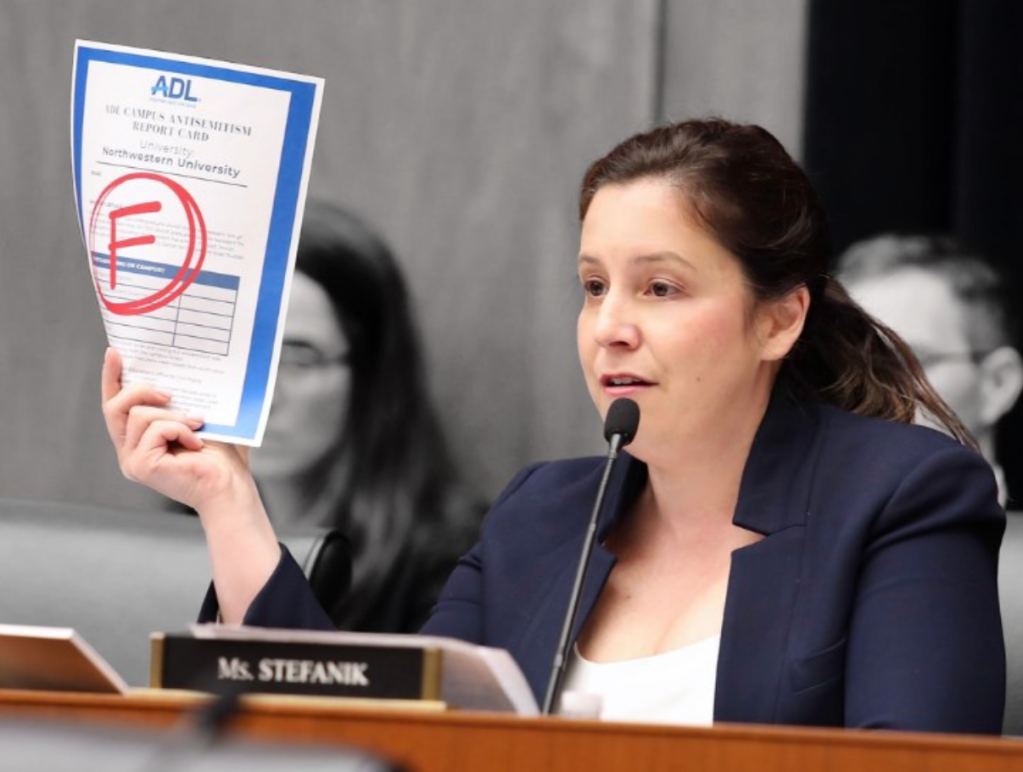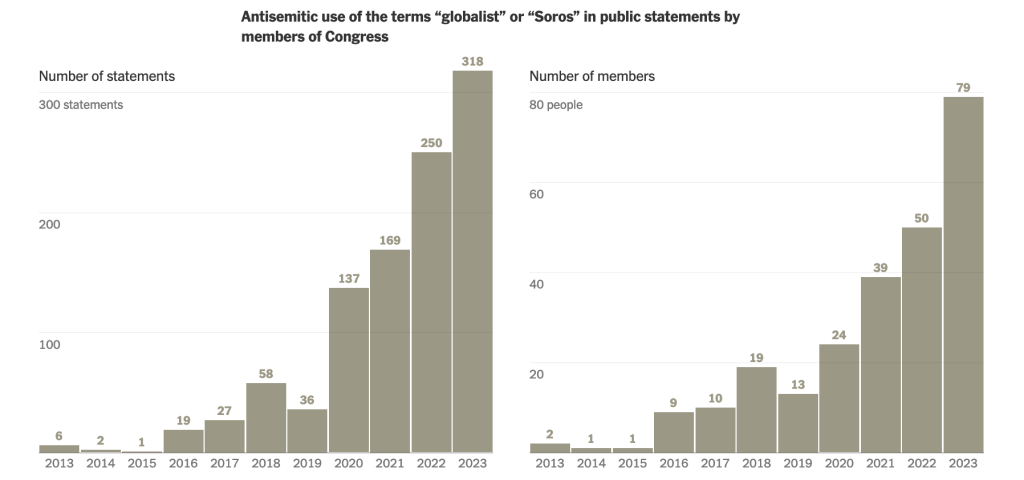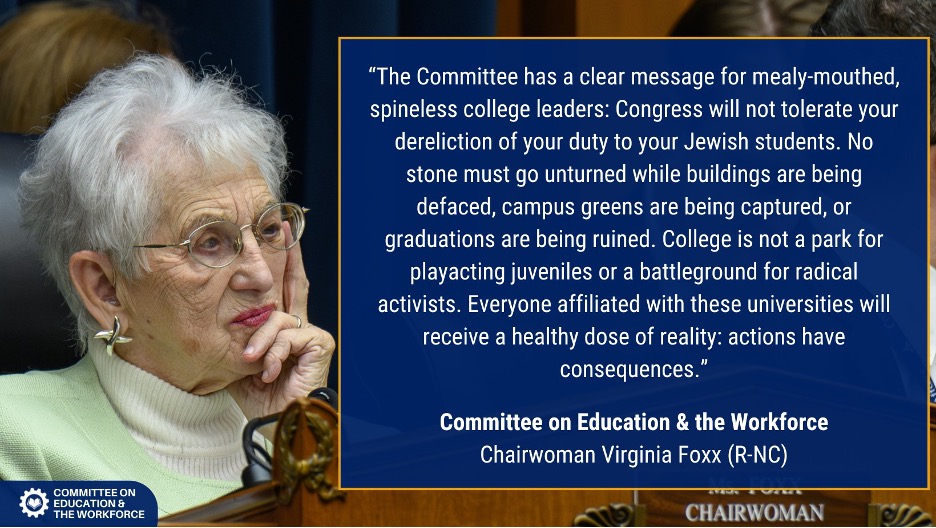At a time in which we all seem to have followed Alice through the looking glass, some comments from the most recent hearing of the House Committee on Education and the Workplace might not rank very high on our list of puzzlements. Certainly not as high as, say, MAGA followers describing Hunter Biden’s conviction on two felony counts as further proof that the rigged Justice Department was actively engaged in covering up the “true crimes” of the “Biden Crime Family.” But the comments caught my attention, nonetheless.
The committee hearings were the fourth set convened in the wake of the brutal October 7 Hamas attack on Israel and the support which some student organizations at Harvard had shown for the assault. In its first two hearings, Republican committee members had succeeded in humiliating the leaders of Harvard, Penn, and MIT, and in providing the president of Columbia a stage on which she could humiliate herself. Claiming that university presidents had allowed antisemitism to thrive on their campuses, Republicans charged the campus leaders with everything from a failure to provide Jewish students with a safe environment to maintaining silence in the face of a call for Jewish genocide. (At a third hearing, the superintendents of three liberal-leaning school districts in New York City, Berkeley, and Montgomery County, Maryland, successfully avoided the traps that had ensnared their university colleagues and demonstrated a much clearer sense of how to uphold their educational mission while also supporting their staff and students.)
In its fourth convening, held in late May, the committee heard from the presidents of Northwestern and Rutgers, and the chancellor of UCLA. “Heard from” is perhaps too generous a term as Republican committee members continued to cross-examine the university leaders, demanding yes-or-no answers to complex questions. It is one thing to quickly respond “no” when asked if one’s university supports calls for genocide – of any people. But the issues at the center of debates on college campuses since the October 7 attacks are more complex by orders of magnitude: Is anti-Zionism the same as antisemitism? Are critiques of Israel equivalent to anti-Zionism? Are pro-Palestinian demonstrations legitimate activities? What is free speech on a college campus? What should happen when demonstrations veer toward violence? And how do universities assure the safety of all students without suppressing free speech or vigorous debate? All of these questions require thoughtful responses and, one would hope, dialogue. But, when Michael Schill, Northwestern’s president, challenged the premise of a question posed by Representative Elise Stefanik, she reminded him what these hearings were all about: “No, no, no, no, I’m asking the questions. You’re answering.”

Elise Stefanik, during Committee hearing. Credit: Stefanik Facebook page
But the comments that truly caught my attention came from Congresswoman Lori Chavez-DeRemer (R-OR) who lectured the university leaders on Jewish history while accusing them of being “directly responsible” for the rise of antisemitism on their campuses. Not content with that, she counseled them to take advantage of their stay in Washington to visit the United States Holocaust Memorial Museum where, she recommended, they should “kneel down and touch the stone which paved the grounds of Auschwitz. I want you,” she continued, “to peer over the countless shoes of murdered Jews.” The Holocaust, she schooled them, was “enabled by global culture, indifference and hatred.” I’m sure they appreciated that lesson, particularly as it employed a classic antisemitic trope when explaining the rise of… antisemitism: When nationalism is on the rise, Jews have historically been attacked as “globalists” whose allegiance lies with “global culture,” and not their own country.

Source: New York Times, May 8, 2024
Just to be clear: Gene Block, the chancellor of UCLA, and Michael Schill, the president of Northwestern, are both Jewish. Representative Chavez-DeRemer isn’t. So what else is new, we might ask? Non-Jews have been telling us how to be “good Jews” for a very long time. Former President Trump who, as the Washington Post delicately put it, has a “long history of trafficking in antisemitic tropes,” does it all the time. So, Rep. Chavez-DeRemer’s conviction that she has the authority to lecture those who are better equipped than she to understand the impact of antisemitism should not surprise us. Neither should we be startled by the eagerness shown by Republican committee members over the course of these four hearings to leap to our Jewish defense in the face of pro-Palestinian student demonstrations since, clearly, we Jews are incapable of either understanding our own history or even knowing who our enemies are.
I can’t tell you how much better I feel with Virginia Foxx, the committee’s chairperson, looking out for my interests. After all, who better to defend Jews than the woman who argued that Matthew Shepard’s murder was not a hate crime, maintained that the Obamacare was more dangerous than “any terrorist right now in any country,” and introduced legislation that would allow companies to require the genetic testing of their employees, giving them access to their employees’ health information and genetic testing results.

Source: House Committee on Education & the Workforce Facebook Page
I also thought about Chavez-DeRemer’s recommendation that the university presidents visit the Holocaust Memorial Museum, for it brought to mind Dara Horn’s brilliant and acerbic book, People Love Dead Jews: Reports from a Haunted Present (WW Norton, 2021). If you haven’t read it, Horn states her thesis on the first page: “People love dead Jews. Living Jews, not so much.” The book includes a chapter, “Blockbuster Dead Jews,” in which Horn considers an exhibition she attended in 2019 at the Museum of Jewish Heritage in Manhattan. “Auschwitz: Not Long Ago, Not Far Away” was one of many Holocaust-related exhibitions and purpose-built museums that sprang up in the United States and abroad beginning in the 1990s. These exhibits and museums, Horn wrote, were “imbued with a kind of optimism, a bedrock assumption that…people would come to [them] and learn what the world had done to the Jews, where hatred can lead.” This optimism was grounded in the exhibit planners’ expectation that visitors, armed with the knowledge gained during their visits, “would then stop hating Jews.” That is, after all, what Chavez-DeRemer had in mind when she advised the university leaders to visit the Holocaust Memorial Museum since “hatred” was what enabled the Holocaust.
Maybe more people need to go to these exhibits since, it would seem, people continue to hate Jews. Since the election of Donald Trump, in the U.S. we have witnessed the Jews-Will-Not-Replace-Us march in Charlottesville (2017), the massacre at the Tree of Life synagogue in Pittsburgh (2018), the shooting in the Chabad of Poway synagogue near San Diego (2019), the attack on a kosher supermarket in Jersey City (2019) and on five religious men in the home of a Hasidic rabbi in Monsey, New York (2019), as well as arson attacks on Jewish centers in Boston, Chicago (2019) and Austin (2021). (The October 7 attack by Hamas, and the massive and ongoing Israeli offensive in Gaza, have occasioned an increase of antisemitic activities on some elite campuses: Jewish students have been followed, harassed, and called derogatory racial epithets; some have been attacked. The same, of course, can be said for pro-Palestinian students, who have also found their free speech rights largely abrogated. But the majority of the demonstrations and encampments – which have taken place on approximately 107 campuses out of a total of nearly 4,000 institutions of higher education in the United States – have been peaceful.)

Charlottesville “Unite the Right” Rally, August 2017. Credit: Sipa via AP Images
Horn, however, suggests that antisemitism, including the Holocaust, its historically most extreme form, is rooted in something more substantial than Chavez-DeRemer’s platitudes about indifference and hatred. “The Holocaust didn’t happen because of a lack of love,” Horn writes. “It happened because entire societies abdicated responsibility for their own problems, and instead blamed them on the people who represented – have always represented…the thing they were most afraid of: responsibility.”
“Antisemitism is at heart a conspiracy theory,” Horn observes, “and one appeal of conspiracy theories is that they absolve their believers of accountability, replacing the difficult obligation to build relationships with the easy urge to destroy. The insane conspiracy theories that motivate people who commit antisemitic violence reflect a fear of real freedom: a fondness for tyrants, an aversion to ideas unlike their own, and most of all, a casting off of responsibility for complicated problems.”
It is hard to square the congressional Republicans’ much proclaimed regard for Jews with their abject allegiance to a leader who has constructed a worldview animated by conspiracy theories. It’s hard to believe that Chavez-DeRemer, Foxx, Stefanik, or the other Republican members of the House Education Committee have anything more than an opportunistic concern for Jewish lives when they have thrown in their lot with an authoritarian (“I am your retribution!”) who insists that immigrants are “not humans…they’re animals,” accusing them in Nazi-animated language of “poisoning the blood of our country”; when they kiss the ring of a deeply flawed individual who calls his opponents “vermin” and threatens to lock up political rivals; when they lionize a man who categorically refuses to take responsibility for his own actions.

Source: New York Times, May 8, 2024
So, many thanks to Reps. Chavez-DeRemer and other Republicans who have the chutzpah to lecture us on how to be better Jews. I won’t suggest that they, too, might benefit from a visit to the U.S. Holocaust Memorial Museum, except to recommend that, if they ever found themselves in its passage ways, they might slow down a bit as they traversed the displays highlighting the rise of Hitler in the 1930s. But if Republicans are to take seriously their commitment to living Jews, and not just the dead ones, I only hope that they take to heart these words from Dara Horn: “The freedoms that we cherish are meaningless without our commitments to one another: to civil discourse, to actively educating the next generation, to welcoming strangers, to loving our neighbors. The beginning of freedom is the beginning of responsibility.”
Fresh from an Association of Holocaust Organizations conference that troubled me in many ways but also offered me some opportunities to clarify my own thinking, I especially appreciate your analysis here. I read Dara Horn’s book too, and her first essay on the Auschwitz exhibition, and it informed my essay on “Holocaust Public History” in The Inclusive Historian’s Handbook, although I wrote that in a more optimistic moment. Distortion— whether it takes the form of Holocaust Denial or demonization of campus protestors— is bad for civil society. And as Michael Berenbaum said lucidly at the conference keynote, what is bad for civil society is really what is bad for Jews. That is the essence of Jewish history, from Roman times to the present. And it goes both ways… So what concerns me the most, I suppose, is my fear that many people have lost their taste for civil society. That is the “political agenda” I would like to promote in my Holocaust education. It used to not be controversial. I hope we can get there again.
LikeLike
I love your insightful essays and look forward to reading this one over the weekend. In the meantime, I just wanted to mention that Elise Stefanik’s name is misspelled in the caption.
LikeLike
Thanks for the heads-up! Appreciate it.
LikeLike